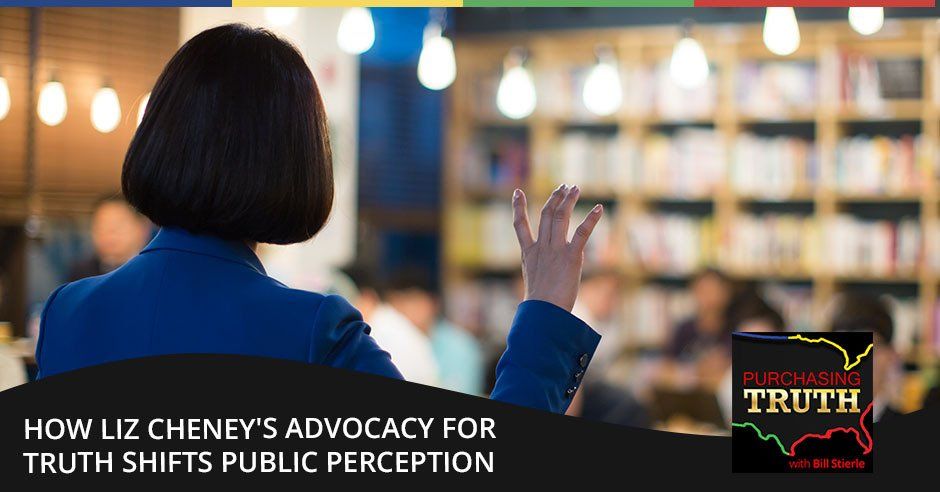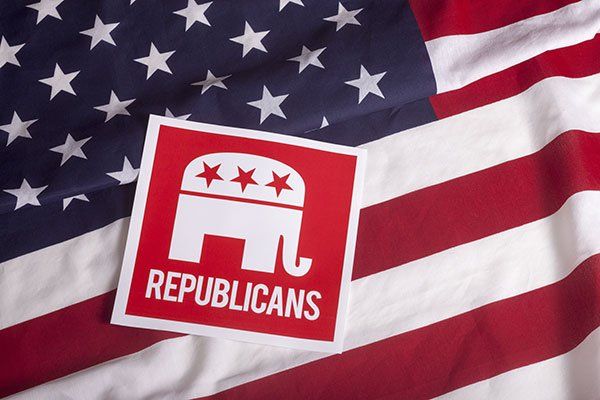How Liz Cheney's Advocacy for Truth Shifts Public Perception
Subscribe Today!
Republican Liz Cheney is currently on a brave advocacy for truth. Her calling out of Donald Trump and decision to choose a different path from the GOP resulted in her House of Representative ousting. Bill Stierle and Tom delve into this path she currently treads, reflecting how the politician pulls into the spotlight the importance of the rule of law and her work in unraveling the truth amid the messy political rifts. They also touch upon Trump's messaging that continues to put a flawed brand to his own party and the entire country. Bill and Tom also enumerate situations where the public is put under a curse and spell of messages, from the ongoing pandemic to the complicated unrest in Afghanistan.
---
Watch the episode here
I'm Tom, along with your host, Bill Stierle. Bill, we talked a lot about curses and spells last time. That was a lot of fun. We can continue that discussion a bit, especially in the context of something that is all over the media, the ouster of Elizabeth Lynne Cheney from her conference leadership position in the House of Representatives. She's advocating for truth, among other things. Let's use that as a departure point.
I appreciate that because when human beings communicate with each other. They're advocating for their point of view, belief, bias, even a fallacy that somebody can create. It's something that human beings have had for a long time. We used to have mythical stories that there would be a king that would put a curse on something and a queen, witch, king, or troll would put the spell, and all those male-type images put the message in. That was the instigator for the story. It was the thing that the story was built around.
The idea with a mythic tale gives us a perspective to see if we're doing the thing because myths and good stories can lead us out of the mess. Facts and information are just points of data in the field of time, whereas a story is something that can translate through time. A person can tell it 100, 700, 1,000, 2,000, or 7,000 years later and it can be as poignant now. We can watch Snow White, look at the seven dwarfs, and think about our emotions going up and down like the seven dwarfs do. That's what that story is about.
How do you manage the emotions? How does a woman manage her emotions? How does a man manage his emotions? How do we deal with these different images? Curses and spells are much a part of that. In media and politics, we're noticing these things. Business, marketing, sales, and branding are all about how's the message sticking? Do we need to create a new message? Do we need to change our message? In one of the first branding messages of McDonald's, millions sold. They used to put the number up on the sign. $1 million, $2 million, $5 million. Every time you drove by, you got like, “I'm a part of changing the number on that sign.” It got to the point where they're over $1 trillion.
I remember when it was $1.5 billion or $2 billion or whatever. At some point, the number becomes meaningless.
They have to change the brand and the brand slogan that goes with the brand. Now, it’s “loving it.” That's the new slogan. The challenge that Elizabeth Lynne Cheney, the Republicans, and the Democrats have is getting messages to stick. One of the magical things that former President Donald Trump would be able to do is he would look at the messages and say, “That message is going to work best. That one is going to stick. This one is going to stick.”
He’d even use his rallies as branding and marketing test cases and see how the crowd would cheer. After he tests it, he goes, “I've tried this message out. Drain the swamp.” I didn't like it at the beginning, but now all of a sudden, I've got some great cheers from that, so I'm using it in all of the things. How do you like it? They’re like, “Drain the swamp.” He's testing branding and marketing in real-time. People don't understand it. That's an enrollment piece. It’s, “I'm enrolling loyalty,” which is a part of the curse. When you're loyal, you're not questioning whether the thing is true or not.
That is true and, at the same time, scary, isn't it?
Correct. If I'm loyal to a person, TV show, network, product, or service, some of that stuff can be great. Also, you'll never notice if you're loyal to a product if they change the ingredients on the product. Both of us can take a breath. All-natural food was when it first came out, but that was too expensive, so we changed it and put artificial things in. Because the brand is associated with all-natural, we get to keep the title but the ingredients are not true anymore.
That's unsettling.
Let me pick on one, Tom's toothpaste.
I think of it as all-natural and not tasting good. Maybe being better for the environment.
It had all of those elements at the beginning until it was bought by a major toothpaste company and they changed the ingredients.
I didn't even know that.
That's what this session is about.
You led me down the path.
That’s called the spell. The spell is that, of course, it’s staying the same but there's a fallacy in that. The thing is not saying the same because the environment has changed. What you thought is true is not fully true. It's partly true. On the box, it's true. There are some of the same ingredients mostly. Remember that sweetener that they had in it before that was all-natural? They tapped that out and used another one that was more cost-effective for the company to produce. The consumer won't know and mind. That's a spell. Curses and spells are important for us to take a look at as the theme. Elizabeth Lynne Cheney goes back to a bedrock principle that she can build upon, “I'm staying with the Constitution and I'm making sure Donald Trump does not sit in the White House again.” In those two simple messages, the first one is curse-free.
She also said under the rule of law.
The rule of law says this, “I'm sticking with that because if we're not sticking with that, we don't have the thing that we've had for the last 250 years. We're going to go back to that and do that thing because that's what I'm standing for. I'm going to make sure that the person that was the representative of this is not there.” Can Elizabeth Lynne Cheney build her brand image and recapture the imagination of the Republican Party in order to go and get other people back in her direction? Can she get the party to steer back more towards the middle and away from the right?
I don't know if she can. She sure is going to try. The irony is that the Republicans who are loyal to Donald Trump in Congress, the word they keep using is fealty to Donald Trump. Is that a condescending term? They're saying they're bowing to him. They're acquiescing to him or something. They're in lockstep with the former president. The irony is they've given her a bigger platform by making such a fuss over removing her as a Republican leader in the conference and in the House because she's on every national program. Everybody wants an interview with her and it's being elevated.
They lifted her profile by the separation analysis. I don't know if it's planned or if it's unconscious. My brain mostly thinks of some of these things as completely unaware and unconscious. They don't know that there is a bigger branding boost for Elizabeth Lynne Cheney, the Cheney mindset, and the Cheney administration. What's going to be the Elizabeth Lynne Cheney Rule of Law? How is Elizabeth Lynne Cheney going to run the country? I'm already starting to brand her without her knowing it on this episode.
You're branding her as a presidential candidate almost right there.
There are certain things that you can't get traction on the big steal or the big lie. Donald Trump took a run at rebranding the big lie and said, “The big lie is the election was won by President Joe Biden.”
He tried to do that. That didn't seem to stick, did it?
That branding is something that is a little bit like throwing spaghetti on the wall to see if something is going to stick, Tom. For all of those people who are reading from a political standpoint, you can see how this works, but also, those of you need to remember this works for businesses as well as personal identity and how do you rebound from a mistake? If you make a mistake, step in and through it. Don't try to wallpaper over cracked paint. Scrape the paint off first before you put the wallpaper back on it at least and say, “It used to be cracked paint but you can’t tell.” At least do that. The Republicans are struggling with their wallpaper job. They're not cleaning off the garbage that's underneath it.
One of the things that's most shocking that's come out since Elizabeth Lynne Cheney has been removed from her conference leadership position is that House minority leader Kevin McCarthy has said, “No one has ever said that President Joe Biden is not a legitimate president.” He said that. Of course, he was in the Oval Office when he said it because all the leadership was meeting with President Joe Biden. He said, “We're not saying that President Joe Biden isn't the legitimate president.” Everybody watching who has seen him in the media is looking at that with a questioning look, “Really?” He, among others, has been saying exactly the opposite that there's so much fraud, the election was stolen, and among other things, he's trying to paper over. It’s what I'm trying to say.
Something weird in branding, marketing, and messaging time is that you can deliver one message in one bubble, and then you could deliver a counter-message in a different bubble because those bubbles of people aren't talking to each other and don't look at each other's stuff. He can say that to this, and then all of a sudden, they can flop back in a microsecond because one bubble will pick up the message over here and the other bubble will pick it up over here. Because the bubbles are separate, the greater population doesn't see it's happening. Here's a good example. Lindsey Graham, after the insurrection, says, “I went a long way with Donald Trump and this is where the journey ends.”
He did say, “No more.”
Liberal media picked it up and pushed it. He's seen the light and he's now going to be an advocate. He's going to be on the other side of this. In a week, he flies down to Mar-a-Lago. Within a 1, 1.5, 2 weeks or whatever it was, he flew down there and delivered an entire set of messages that could be picked up by Fox and put on. That is counter bubble messaging.
I've heard him saying, “I've determined that the Republican Party is better off with Donald Trump than without Donald Trump.”
That is something that plays wonderfully inside the 73 million people that voted for the former president and it doesn't play in the 81 million but there's no consequence to Lindsey Graham because he's just got to worry about South Carolina and then worry about his national presence. Whether or not somebody calls him a flip flop or not, he's a talking piece that is messaging into various different bubbles and different messages. You and I have done similar things in our businesses. We say, “Here's one vertical I'm going to talk about and I need to talk in that language of IT. Over in this other marketplace, I need to talk in this level of manufacturing with China.” Those are different bubbles of people and they're not necessarily paying attention to each other.
This does happen in business a lot. No question.
The good part of this story with curses and spells is that they can be a curse. The curse is broken and you've got to have enough pressure for the curse to be broken. The stakes have got to be high enough. Right now, the stakes are not high enough yet to break the curse. The spell is something you wake up from.
Would you say that the curse on the Republican Party is in some way Donald Trump's stranglehold over the party still and Elizabeth Lynne Cheney's trying to wake them up from it?
That's right. The Republicans have a tough run to wreak claim loyalty to the party, not loyalty to the person. Many of them will struggle with the word integrity because they don't have that. It's not to say that the Democrats don't have some problems with integrity, too. They have all kinds of certain integrities. There's a list on their side. To break a curse, you’ve got to stare and walk through it. It’s one of the things that Elizabeth Lynne Cheney has started to do. Mitt Romney is too nice and what he needed to do was to stare it down. At that conference, he needed to apply empathy and directness, which is something he didn't do. He walked out there and said, “Everybody knows I'm not a great fan of the last president.” He's going to get booed every single time with a sentence like that, but he could have done this. I would like Mitt Romney to say this because I'm interested in the United States of America. I'm not interested in bipartisan America. That's my advocacy.
I want Mitt Romney to have a solid conversation with Americans. I'm pretending I'm Mitt Romney. “I stand up in front of you feeling torn because a part of me values these Republican principles. I value this and I value this. I feel torn because another part of me knows that the president did not live up to those values yet. Because he was a Republican, I supported him most of the way. As a person of integrity, I drew the line at.” All of a sudden, he sounds like a presidential candidate. He starts to reclaim and it moves back into a leadership position where you can work with the person.
From what he could have said, his message there is not that far removed from what Elizabeth Lynne Cheney is saying. They're both saying similar things but in different ways.
Elizabeth Lynne Cheney is missing and she hasn't put in her narrative empathy for the Donald Trump supporter. You got to empathize with the people. They put their vote in. They put their bet in on that guy. He did sell a good message. “I'm going to be different. I'm going to be an outsider. I know great people that we can work on this. I can come in and I can have this. We're going to run this more like a business because I am a successful business person.” They bought all of those narratives. The person's personal bias said, “I've been working for a successful business person. Donald Trump is a successful business person. I know what successful business people do because my boss is one of them. Clearly, he's going to be like my boss.” The answer is, “No. He’s not like your boss at all.” He has these other narratives that are regrettably not collaborative or cooperative that's needed inside the political space.
How could Elizabeth Lynne Cheney empathize with that loyal Donald Trump voter with the whole narrative of trying to push Donald Trump out the door? She's gone all in saying, “I'm committed to not letting the former president get anywhere near the Oval Office again.” She's declared war.
Her next sentence is, “I hear you feel angry. You're feeling angry because a part of you would like the former president to tell the truth and be integritous about what the vote was. It's a lot easier for you to believe that your vote was not counted or that other people voted and caused your vote to things. I could see how painful that is because that affects your need for trust and integrity that I'm willing to fight for now.” She's got to get 1/3 of people to move in her direction.
She's pulling loyalty away from Donald Trump and trust in a way and instilling it in herself.
At least she'll know, “I'm going to stand for trust. At least you know I am going to be an advocate to be straight with you and be truthful with you.”
This kind of messaging is how Elizabeth Lynne Cheney can beat back any primary challenge from Donald Trump in Wyoming and get herself reelected.
With the restoration of the Constitution, she could pull out lines out of the Constitution and start advocating. “We need to start working towards this value set because this value set is not being done the way I would like it to be done. This is the way I see this value in the Constitution.” The Constitution is long and it's easy to read.
Bill, ironically, I have a little pamphlet of the Constitution of the United States. It's been sitting on my desk for a while. Somebody gave it to me at an event. I'm a fellow member of the Board of Advisors. I happen to have the Constitution. It’s a quick read. You're right.
The Bill of Rights has a piece to it that works well with it. “These are the changes or additions or the clarifications that we've made along the way. This makes us a better nation because we're working to have a common document that we're in agreement about. This is what it means to have freedom of speech and here are the limitations of the freedom of speech.” That is also dropped. Notice that there's a split of the belief. “I have freedom of speech.” The answer is like, “You do and there are limits to that.”
People don't understand that. They think that means you can say anything you want anytime you want. That wasn't the whole purpose. It was freedom to speak out in opposition to your government without fear of repercussions from a ruler or leadership.
That's a great example. When you split the value of the freedom of speech and you take it away, that's when it becomes a spell. I believe in it but yet, I am not conscious that my belief is this small where I need to stretch my truth to encompass this. It's tough to stare down these things because this is the path forward. Having better-skilled communicators and people that stand and advocate for the fuller advocacy of what that value is.
Curses and spells give us a way to talk about things that we would call half-truths, a point of view, a bias that has limitations to it, or something that is completely from a place of fallacy. Here's an example. The big steal or the big lie. Donald Trump can counter those messages and start putting a spell in. Here's his spell. “When we see what's happening in Arizona, what's going to happen in Georgia, Pennsylvania, Michigan, and we will see the things that they're going to find.” That's a spell.
Putting people under a spell that the big steal is going to be revealed. Is that right?
That's right. There's a mystery. That's a part of something that you and I talked about bid sellers do. They present a reward, create anticipation, and create uncertainty. We're not sure what they're going to find.
Donald Trump's favorite, greatest hit line, “We'll see what happens.”
That is an uncertainty sentence. That is a calculated metamessage that's in the propaganda space for him.
Precisely to convey the feeling of uncertainty.
Human beings are sensitive. We are sensitive creatures. We're susceptible to our biases, fallacies, and limited beliefs. We're interested in drawing lines from something we know to something we don't know in any way we can get there. We could take a person out of scripture and draw to our current condition somehow. This is why this rule works here. We could take something out of any one of our limiting beliefs and draw it to, “This is why this is true.” It's like, “How did you get there from here?”
If you want to watch this in real-time, start listening to kids. Kids are drawing their version of truth, which is far from the truth. My son will easily say to me, “I worked on my homework. I got most of it done.” I can check online and he did 1 out of 6 assignments. He’s like, “I can play my game now.” They’re going to draw the truth of their freedom and independence in any way they can get there at the expense of integrity, trust, and things like that.
Let's give a few more examples of some curse and spell messages that a lot of people will relate to and help understand the concept a little more.
I appreciate that. For example, you and I talked about recycling at one point in one of the episodes and the concept called Wish Cycling. “I wish that could be recycled.” We throw that in the recycle container. That's an example of a person that is from the left, thinking, “I got to do my part in recycling and this thing will never be recycled.” “They'll pull the metal out of the umbrella.” No, they won't. They’ll just throw out the umbrella because there's not enough value on the metal that goes into that umbrella. It's got to go to the dump and it's over. Wish cycling is example one.
Another example of a spell was during COVID when the former president said, “The COVID will go away like a miracle.” People felt calm because the word miracle is familiar. You'll see it and it's going to go away. He's meeting the need for reassurance. That's the reward. “I'm getting reassurance now. It's not as scary. My leader told me that it's going to happen this way and it's going to go away. COVID is going to disappear in the spring when it gets hot where you don't have the cold anymore.”
Summer is one of the biggest surges.
We got pummeled because when you're under a spell and you're investing in that belief, you're not looking at the problem honestly. Soon, the numbers will be next to nothing. The COVID numbers will be at zero soon. It's reassuring, but it's not fully truthful about what you're experiencing. If there was a rapid response, doing something actively to move things into action, set up infrastructure, and do all the things that when the government is asked to do, it will do it. President Joe Biden knew where all the levers were and started pulling.
He ramped up that distribution.
He lived an entire life inside the system. It's like you and I knowing where many of the things in our houses are. I know where my silverware is kept. You know where your silverware is kept. You know where to go to get that. President Joe Biden, having lifelong experience in government, knows where all the levers are. He doesn’t have to find it.
What I might say is that I know where the fire extinguisher is in the house. When there's a fire, you need to put it out. You need to know where that fire extinguisher is. Otherwise, you’ve got to get out of the house if the fire happens.
Americans will be a little more hesitant about getting a full outsider in a leadership position without at least doing some time in Congress or Senate before they can do it. You’ve got to also have some chops. It's not like saying Barack Obama had a ton of experience coming in there because he didn't. He was the fresh senator, but at least he knew how to talk to people and how to network because he did that well. He took advice and he kept people from the old administration on even people that caused the problem.
He did for a while.
He’s like, “You cause them. You're going to get us out of here. How did you guys get us in this mess?” “This is what we did.” “I've been working with you for two years. You better be turning this around.” He’s like, “Geez.” Curses and spells are important things to talk about and engage in. We can restore them. A spell can be restored. It's waking up. It's having an awareness of it. It's like having awareness of the problems in Afghanistan and then getting out or Iraq and then getting out. When we got out, of course, there were consequences for getting out. ISIS rises up because we took away the strong man that was holding that thing down and all of a sudden, it’s like, “There are Americans here. They are going to make it right.”
The answer is, “We don't even know how to make things right in your country.” “You’ve got to figure it out.” “Not many are practicing figuring it out.” Welcome to the mess that we have in two other countries that they've got to figure out how to rebuild. The Taliban wants to do things conservatively and now, there's a group of people that don't. How are they going to work together? The whole country can't be conservative like it was.
Too big of a problem for us to solve in this episode. I'll tell you that.
It's a lot of communication that's needed and a lot of belief changes. These curses and spells also work with vaccines. The beliefs about those, how a message can get started, how a message can become a curse, or a message can become a spell. Big Pharma is evil, bad, and crux, doing vaccines to be a moneymaker or going to jack up the prices foreign. It's a challenging thing when we take this unique view of our environment and messaging to pursue truth through the window of curses and spells.
I thought of one more thing. Bill, before we go, I want to ask your thoughts on this because I don't know if you saw this news talking about people reluctant to take vaccines. They're skeptical that they don't work or that they're dangerous. The governor of Ohio, did you see what they did there? They're trying to incentivize the population of Ohio to get vaccines. I don't know if you call this a spell. Certainly, maybe a bribe.
Anybody who gets a vaccine are having a lottery every week. For all the people that got a vaccine, one person's name is going to be pulled out and they get $1 million for five weeks in a row. There's a reward for getting a vaccine. For students under college age, they're doing in that lottery that you get free tuition, room, and board at an Ohio State University or college when you get to that age. They’re giving rewards and incentives for people to get vaccinated. It's a bit controversial and some people are criticizing it. Talk about a spell, “Come get a vaccine and you might get a big reward.”
It's trying to put some kind of incentive. Usually, incentives are good for short-term compliance. They don't work for long-term compliance. By running it for five weeks, it's like get in and get out. All of a sudden, there are folks that are interested in that gamble and are interested in participating. It adds a little push to get them through the hesitancy and allows a little bit of ability to move forward.
I’d say that might be a spell.
There's a wonderful book called Punished by Rewards that talks about how incentives only work in a short-time thing and they have long-term problems when you use too many incentives. That's another episode for sure. It'll be interesting to see if Elizabeth Lynne Cheney and the Republicans can do a better job of re-cultivating a message that's going to work that's in a greater alignment with truth. It'll be interesting to see how the Democrats do a better job of saying, “Here's the Infrastructure Bill and I know we're throwing other things into the sink that we would like to be cleaned up about.” President Joe Biden has been straightforward in going, “This thing that's going to put women back to work is not an infrastructure thing, but it is an economic thing that will help to rebuild the infrastructure of business.” He knows it's not a rode in a bridge, but it's still an economic impact.
It's a bridge to recovery and moving forward. That's a metaphor, but he makes a good point to put people to work in rebuilding the infrastructure of business. That's brilliant.
That’s the micro message. We're interested in the infrastructure of business, too. Not necessarily brick-and-mortar and rails and roads, but we're interested in rebuilding the business infrastructure. “Have you noticed that the restaurants were closed? We need to rebuild the restaurant industry. This has got to be a part of an infrastructure rebuild.” You and I are coming up with marketing messages and branding messages for the party, which is important. Both of them need it.
Irrespective of politics and ideology, I would be happy to see Elizabeth Lynne Cheney message what she needs to restore, integrity, principles, values, or whatever to the Republican Party. I would be happy if President Joe Biden messages this Infrastructure Bill better because as a businessman myself for growth in America and for prosperity, that would be useful.
Tom, this is a good one. Thanks a lot. This was great. Thanks, everybody, for reading.
Thanks, Bill. I enjoyed it.
Important Links:
Love the show? Subscribe, rate, review, and share!









